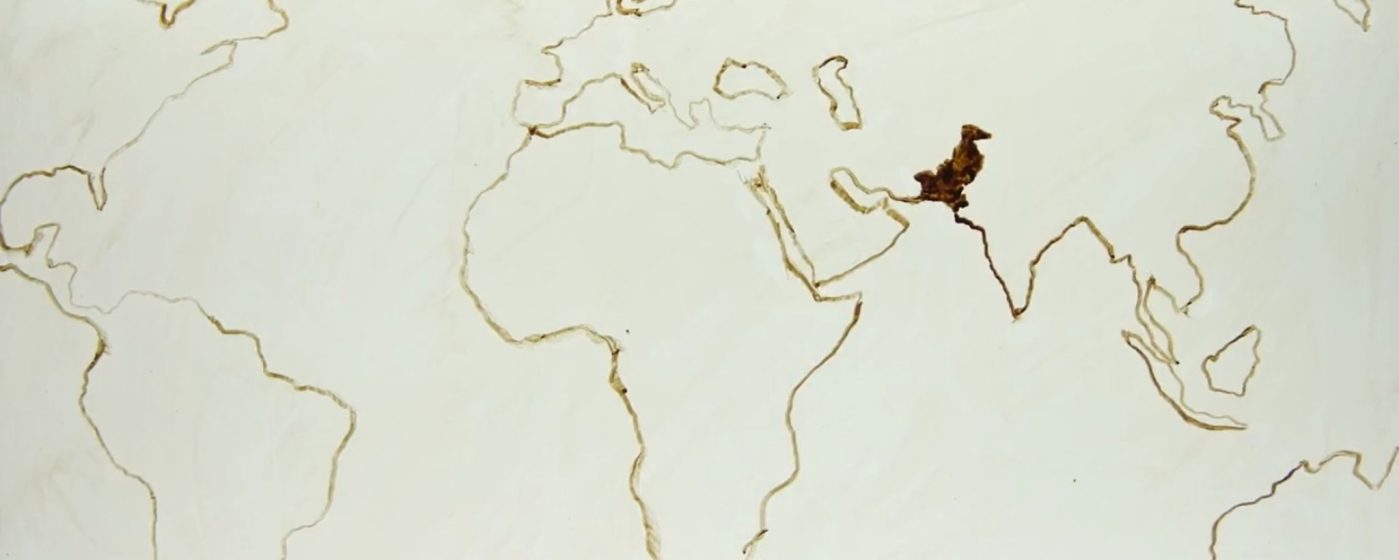-
Address
Red Room, Chelsea College of Arts, 45 Millbank, SW1P 4RQ
-
Time
6:30-8:30pm
-
RSVP
Booking required.
£3 (booking fee applies) - Artists
Join us as curator and journalist, Ali Nobil Ahmad presents research into historic and contemporary filmmaking practices and ecological struggles in the global South, with curator/researcher and lecturer Dr. Nicole Wolf as respondent.
Analyzing an array of themes, forms, and strategies deployed in environmentally engaged documentary, cinematic fiction, and visual art, Ahmad considers some of the most inspiring filmmakers since the 1970s. Special attention is accorded to exilic Pakistani director Jamil Dehlavi, whose sublime works of cosmopolitan modernism, recently screened in a retrospective at the British Film Institute and released on DVD, encapsulate a visionary, subversive eco-theology derived from religious experience and modernist philosophy. Lesser known voices and approaches are also identified in a selective survey of the current wave of digital documentary and art films to address climate justice in Asia and Africa, screened in Berlin in 2017 as part of the anthropoSCENE festival.
Then, in a personal reflection on his own practice-based, collaborative work in the context of Pakistan, Ahmad discusses his growing interest in questions of human and non-human agency, kinship, and care across species. Theoretical, praxis-related, and ethical issues surrounding the politics and aesthetics of language, still and moving images are explored with close reference to his two experimental documentaries about the aftermath of the 2010 floods in Pakistan, Waseb [Nation] (2015) and Lok Sath [People’s Tribunal] (2018). He will also discuss his most recent film on tape ball cricket in Lahore, a Punjabi homage to CLR James, currently in production.
Participants
Ali Nobil Ahmad is a researcher, occasional curator, and journalist with interests in media, migration, and environmental politics. Based in Berlin since 2014, he is currently a Fellow at the Zentrum Moderner Orient. He has previously been Visiting Professor of South Asian Studies at Brandeis University, Assistant Professor of History and the Lahore University of Management Sciences, and a recipient of the Guardian’s Scott Trust bursary for journalists. His monograph, Masculinity, Sexuality and Illegal Migration, published by Routledge and Oxford University Press, was based on his PhD, a study in human smuggling from Pakistan to Europe, received from the European University Institute in Florence, Italy.
Ahmad’s curatorial credits include anthropoSCENE: film and climate justice in Asia and Africa (Kino Moviemento Berlin, 2017); Jamil Dehlavi: Between the Sacred and the Profane (BFI, London, 2018), and Cinema in Muslim Societies ICA, London, 2011). He has extensive experience as a print journalist, and writes regularly for international media outlets such as the Guardian and the National (UAE). He has made two short, experimental documentaries about the 2010 floods in Pakistan and their aftermath: Waseb [Nation] (2015), and Lok Sath [People’s Tribunal] (2018). His most recent film about cricket in Lahore, Single Wicket, is currently in production.
Dr Nicole Wolf (Berlin/ London) is Senior Lecturer in Visual Cultures at Goldsmiths, University of London. Her research, writing, pedagogical and curatorial projects concentrate on political cinemas, cinematic/political alliances in the face of conflict, war and occupations and the poetics of artistic and activist practices towards critical ecologies. The latter is currently developed through practice-based research on agri-cultural resistance and an explorations of ‘Cinématics of the Soil’.
Nicole’s training in anthropology informs her critique towards neo/colonialist forms of knowledge production and much of her research stems from a long-term engagement with and learning from the South Asian region. Questions of evidence, witnessing, the mnemonic and how to rethink justice through artistic and film making practices, in relation to state violence and more recently with regards to climate injustice, have guided her research.
Her participation in ‘Living Archive – Archive Work as a Contemporary Artistic Practice’ and ‘Archive ausser sich’ (both projects by Arsenal – Institute for Film and Video Art, Berlin) include research and writing for the restoration of the feminist film collective Yugantar’s (1980-83, India) works, the interdisciplinary ‘Soil – City- Solidarity. An urban permaculture design course’ and ‘”Tell me what matter was the ground” – Repair beyond Redemption’ (June 2019), both part of the project Stoffwechsel. Together with Mojisola Adebayo, Nicole co-conceived “Agri-cultural Practice – An Experimental Workshop for Climate Justice” (part of Neighbourhood Academy at Prinzessinengarten Berlin, August 2019), as research practice into agro-ecological and cultural practice as resistance, also seeking diverse forms of knowledge production and dissemination.
Nicole’s recent publications are: “In the wake of Gujarat: The social relations of translations and Futurity” in: Critical Studies 4. 2019; “Is this just a story? Friendships and fictions for speculative alliances. The Yugantar film collective (1980-83)”, in MIRAJ 7.2. 2018; “Fugitive Remains: Soil, Celluloid and Resistant Collectivities”, with Sheikh, Shela; Gray, Ros; César, Filipa; Grisey, Raphaël and Touré, Bouba. 2018. In: Cooking Sections, ed. The Empire Remains Shop. New York: Columbia Books.
Listen to the event here:
Image credit: Screenshot from Lok Sath [People’s Tribunal] trailer (2018), writer and director. Ali Nobil Ahmad
